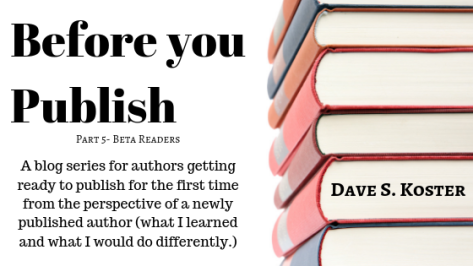
In the checklist I put together in the initial post to this series, I had a bullet about incorporating the feedback from readers of your work before you’ve published. For everything I’m working on publishing, I’ve asked friends and family to read.
To co-opt a saying picked up from someone else, the reader isn’t always right, but they are always the reader. You could also use, where there is smoke there is fire. The point here is that your beta-readers might make observations or commentary that simply isn’t helpful to improving the narrative, but that doesn’t mean you don’t have a problem. It’s true that sometimes, your readers simply didn’t engage with the characters or story and are responding to things in a hyper-critical fashion that should give you pause, but don’t necessarily translate into workable revisions. The flip-side of that coin is critical observations DO need to be addressed. We, as writers, have to identify the difference between readers who just don’t like the writing and those who are pointing out fundamental flaws. The takeaway is that we need to make sure issues are dealt with before we publish.
From my perspective, I take every criticism seriously. As I just said, where there is smoke, there is fire. If a reader tells me that a character isn’t working or a bit of plot doesn’t make sense, I revise the work. Often, this results in a better story. Sometimes, the suggestions weaken the story or chip away at the conflict and effectively water-down the plot. This is why you need to have more than one person read your work. If 9 people tell you this bit was good and 1 person gives you a 10-page diatribe as to why it wasn’t. You take the 10-page diatribe seriously while keeping in mind that 90% of your readers didn’t see it that way. Plus, as the writer, you get to choose – did that really seem to work? Did the revision addressing it result in a better book? Is that criticism productive, or did the reader simply not like it for some reason? This is hugely important, and you have to seriously think about it, but you can’t actually decide if the feedback is helpful unless you make an attempt to incorporate the recommendations.
For every book I’ve sent out for readers to review, I’ve had at least 1 reader that didn’t like it. You can usually tell. Often, if they didn’t like the work, they won’t finish it. Sometimes they ‘finish it’ in the sense that they powered through, but stopped actually reading at some point. This happened to me with my upcoming book, The Dark Queen of Darkness. I had one reader who just didn’t care for it. I asked what he thought of the ending, and he couldn’t say because he stopped engaging somewhere in the middle. Other readers went on to explain what character they liked the best. What this told me was less about revisions and more about the audience. This is another essential aspect of having beta-readers, which I’ll delve into in a later post.
Frequently though, you will get consistent feedback involving flat characters, weak plots, or other things. A writer who is unprepared for that criticism will often shrug it off or blister at it. You can’t do this, even if you disagree right out of the gate. Every bit of feedback is helpful and should be seriously addressed. Sometimes, you don’t do anything with it, but most of the time, you should be making revisions.
If you haven’t sent your book out for review, it’s not ready for publication. This is one of the most emphatic things I can say about self-publishing. I suspect a lot of indie writers will disagree, but from where I sit, it’s one of the most valuable steps in the process. If I could get more feedback, I would.
What do you think? Do you have a different experience?

When receiving critiques, we have to do a kind of gut-check. For example, someone tells you a character is unsympathetic. What do you do?
1) Scramble to give the character an endearing quirk.
2) Hold to your purpose, because that character is not supposed to be sympathetic.
For me, I wait to see if more than one person has the same response. That gives added weight to a critique.
LikeLike